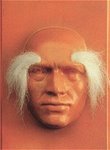
I’m back again everyone, continuing my journey around the poker table and trying to break down boundaries so that the Hold ‘em hopefuls need not feel intimidated by the indigenous types here at Eyebrows.
Yesterday we unearthed the truth about the flop, comparing it to the front page story of a newspaper. Today, we deal with the turn card, which we can see as the first few lines of an editorial comment that might change your view of the front page.
Famous old-timer of the poker circuit Doyle Brunson believes most of the action happens on the flop, usually between two players. He wrote his poker bible ‘Super System’ before the online boom and therefore his thoughts have to be qualified somewhat.
If you start at a low level, there will be times when you see the turn card and you are not part of a warring couple, scrapping to be the bread-winner. There will often be little tykes sitting at the table, trying to spoon from the family pot. It is important to consider their presence if you want to be the Daddy.
The rasp of the turn card can indicate that another player has just hit a draw, particularly if the pot is multi-way. Flushes are the easiest to spot but do not neglect the possibility of straights, particularly if the pot was not raised pre-flop. Other players like to disguise the strength of their hand until the turn.
Here is a scenario:
You were dealt KK in early position, you raise and get three callers. Assuming the flop is free of aces but it has two-suited cards, if the turn card is a blank and your bet is raised by one of the flop callers, there is a good chance that he/she is slow-playing a set – the wait was to see if the flush hit on the turn. It is a play more suited to fixed limit as the turn bets are double those of the flop but it is still a common move in NL. If you are looking at a set, your chance of winning the hand is less than 5% and you should muck because you are not just calling the turn bet – your friend will want to apply the maximum pressure when the river arrives.
Folding on the turn is not easy – but the river card often makes the act impossible.

No comments:
Post a Comment